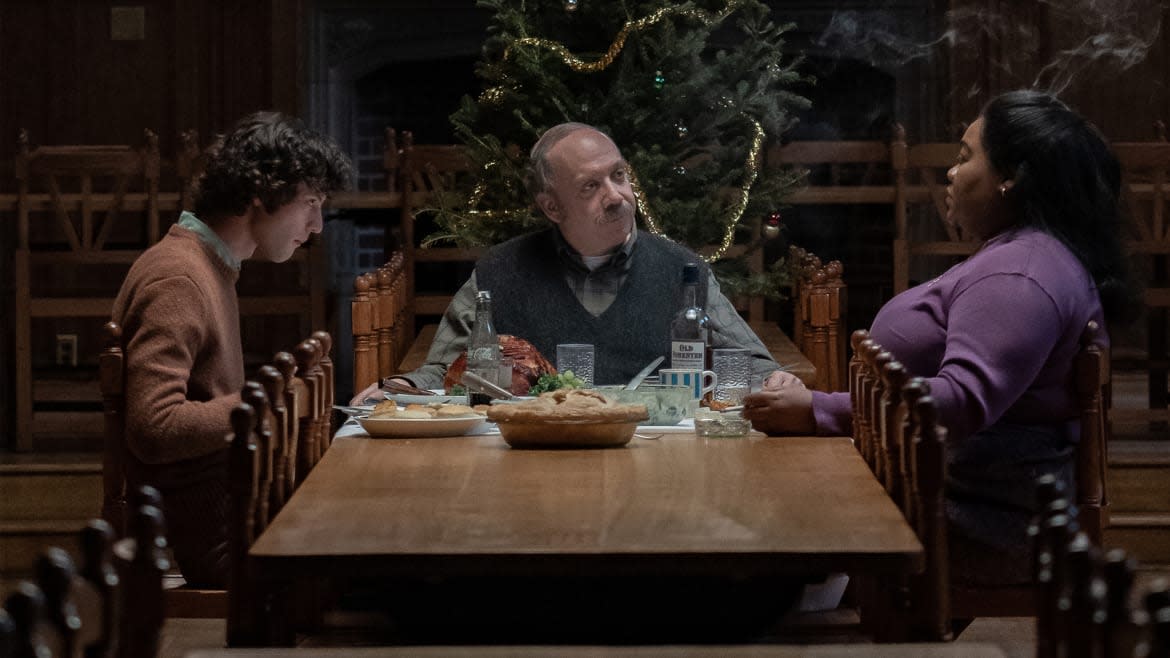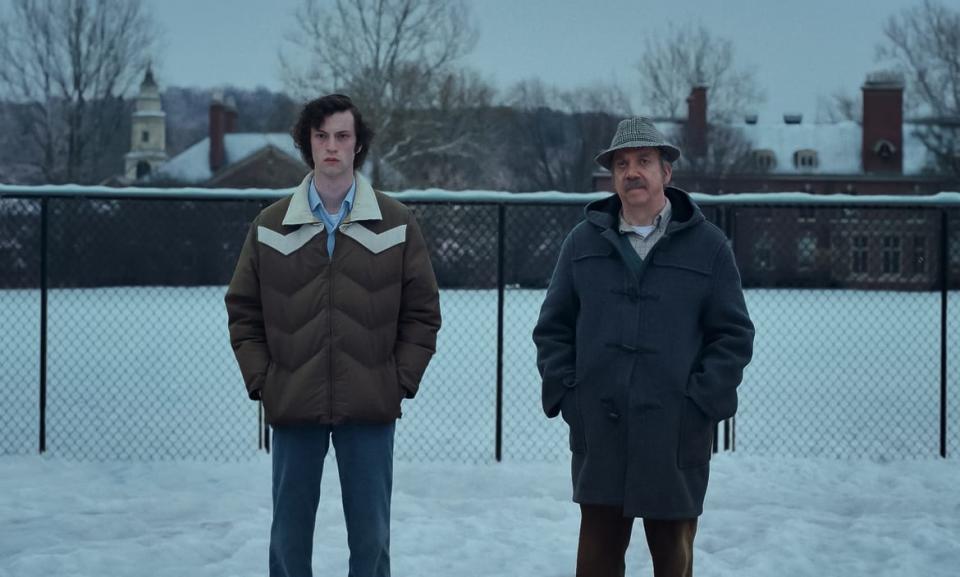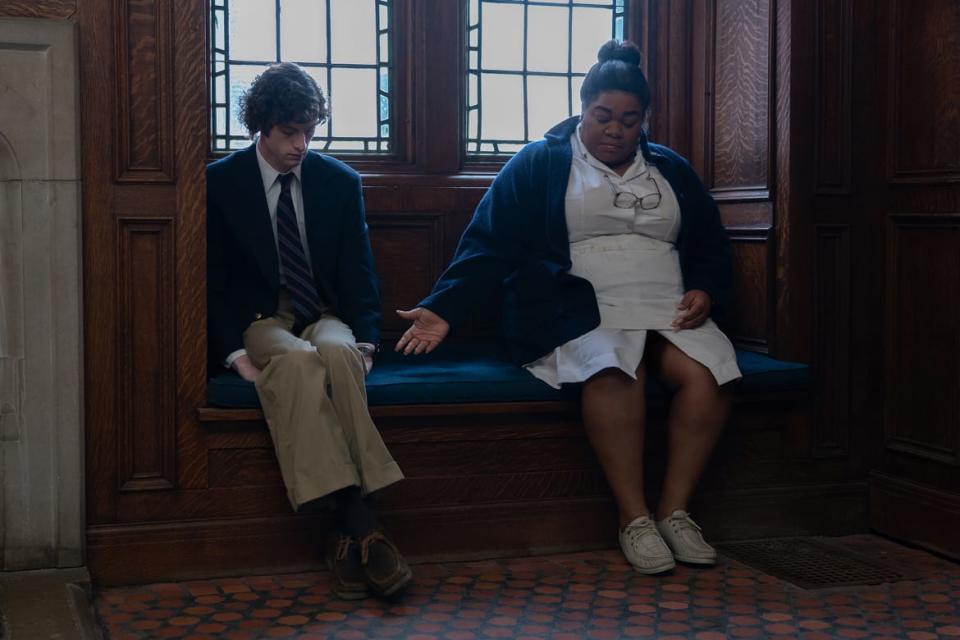‘The Holdovers’ Is Alexander Payne’s Best Movie in More Than a Decade

- Oops!Something went wrong.Please try again later.
- Oops!Something went wrong.Please try again later.
- Oops!Something went wrong.Please try again later.
TORONTO, Canada—There’s no comprehending the present without understanding the past, and yet yesterday need not dictate today or tomorrow—a dynamic that stands at the heart of The Holdovers, Alexander Payne’s humorous and touching period drama. Harkening back to the ’70s and his own triumphant collaborative relationship with Sideways star Paul Giamatti while simultaneously saying something fresh and funny about loneliness, kinship, and sacrifice, the director’s latest is his finest work in more than a decade, and proof that, as his characters learn during the course of their oddball odyssey, the future remains bright so long as the path that led to it is clearly illuminated.
Showing at this year’s Toronto International Film Festival, The Holdovers is set in 1970 and assumes the tone and style of that era, from its opening credits (and studio logo introductions) to its grainy visuals and cornucopia of formal devices, including omnipresent transitional fades and slow zooms across rooms and through city streets toward (and, in one amusing instance, away from) characters. Employing Damien Jurado’s “Silver Joy” and Cat Stevens’ “The Wind” as mournful musical bookends for his tale, Payne overtly channels the cinematic feel of the decade. At the same time, he crafts a distinctly evocative Yuletide atmosphere, his action set during the chilly, snowy final two weeks before 1971, and his soundtrack filled with holiday tunes whose joyfulness is tinged with a particular brand of sweet Christmas melancholy.
The Holdovers initially ensconces itself at Barton Academy, a fictional New England prep school populated by the spoiled children of the rich and powerful. It’s a place that caters to, and perpetuates the privilege of, the elite, and the only individual it employs that isn’t interested in genuflecting to them is Paul Hunham (Giamatti), a harsh and inflexible ancient civilizations teacher who describes himself as an “ascetic” whereas everyone else might simply call him an asshole.
With bad body odor, sweaty palms, and a bushy mustache that seems designed to compensate for his balding head, Hunham is a sweater-vested old-school prick, and the main objects of his wrath are students who think they can coast by on their family name (and fortunes). If his values are correct, however, his methods are less than shrewd, and having recently failed a senator’s son despite the pleas of his headmaster (Andrew Garman), he’s punished with an undesirable task: to stay at Barton during December break and oversee the kids who aren’t returning home to their families.

With a drink never far from his hand, Hunham views this as a prime opportunity to teach rotten apples a lesson, although after mere days with his charges, most are spirited away by one boy’s (literal helicopter) parent. The sole student left is Angus Tully (newcomer Dominic Sessa), a junior whose plans to vacation in Saint Kitts are ruined when his mom opts to instead go on a delayed honeymoon with her new husband.
A smart but unruly teenager who’s been kicked out of multiple prior educational institutes, Angus considers his circumstances a form of torture. Consequently, his early rapport with Hunham is borderline contentious, and only partially eased by the presence of Mary Lamb (Only Murders in the Building’s Da'Vine Joy Randolph), the Black cafeteria manager who’s grieving the death of her son Curtis, a Barton alum who—because he couldn’t afford college like his affluent classmates—joined the military and was shipped off to Vietnam.
Thrilling Satire ‘American Fiction’ Is a Cinematic Stick of Dynamite
Trapped together, the trio are wracked by bitterness over their sorry lots in life and resentment of those who benefit from unfair advantages. Hunham’s belief that Tully is another entitled jerk inspires him to be unduly nasty, just as Tully’s opinion of his teacher as a ball-busting creep blinds him, at least at first, to the adult’s suffering. Yet it’s not long before their frostiness thaws, thanks to their recognition that they’re bonded by loss, lonesomeness, and anger. Beginning with Tully’s separated shoulder (courtesy of an accident in an under-construction gym), their feelings gradually mature into respect and, then, affection. Along with bereft Mary, whose pain is impossible to miss, they transform into a makeshift familial unit, replete with evenings spent watching The Newlywed Show and home-cooked Christmas dinners the likes of which Tully has never experienced.
A night out at a bar, a Christmas party full of romantic potential (some realized, some thwarted), and a subsequent trip to Boston (where Tully plans to reconnect with his birth father) are all incidents that allow these wayward souls to better see, and sympathize with, each other. David Hemingson’s script mines those and additional scenarios for consistent laughs, whether it’s Tully behaving like an incorrigible wiseass or Hunham wielding his imposing vocabulary for choice insults like chiding Tully for his “hormonal vulgarism.” The film is at once somber and jokey, as when Hunham reveals the violent origins of his youthful disgrace to the kid in a Beantown liquor store and the proprietor, handing Hunham his bottle of purchased booze, retorts, “There ya go, killah.”

Through a series of comedic misadventures and heart-to-hearts, the two strike up a confidential pact (“entre nous”), and though the film’s trajectory is never truly in doubt, its cast is so good—Giamatti, charismatically grumpy, arrogant and sad; Sessa, charmingly rude and rebellious; and Randolph, movingly bereaved and kind—that any mild predictability proves inconsequential. The Holdovers draws its characters in distinctive, nuanced lines, even as it makes sure to keep them emotional and physical messes. It’s a constant pleasure to spend time in their company, laughing at their sharp-tongued craziness, empathizing with their relatable anguish, and celebrating their attempts to find a way to let go of the hang-ups that hold them back.
Its sentimentality expertly balanced by its humor, The Holdovers is a story about the lies we tell ourselves (for good and ill) and the reality of our not-so-dissimilar human conditions. Moreover, both looking forward and behind, it’s a film that grasps that everything has been done before and that absolutely nothing is set in stone, and that what bolsters and binds us most of all is compassion for ourselves, each other, and the histories we can never truly escape and are always free to leave behind.
Liked this review? Sign up to get our weekly See Skip newsletter every Tuesday and find out what new shows and movies are worth watching, and which aren’t.
Get the Daily Beast's biggest scoops and scandals delivered right to your inbox. Sign up now.
Stay informed and gain unlimited access to the Daily Beast's unmatched reporting. Subscribe now.

